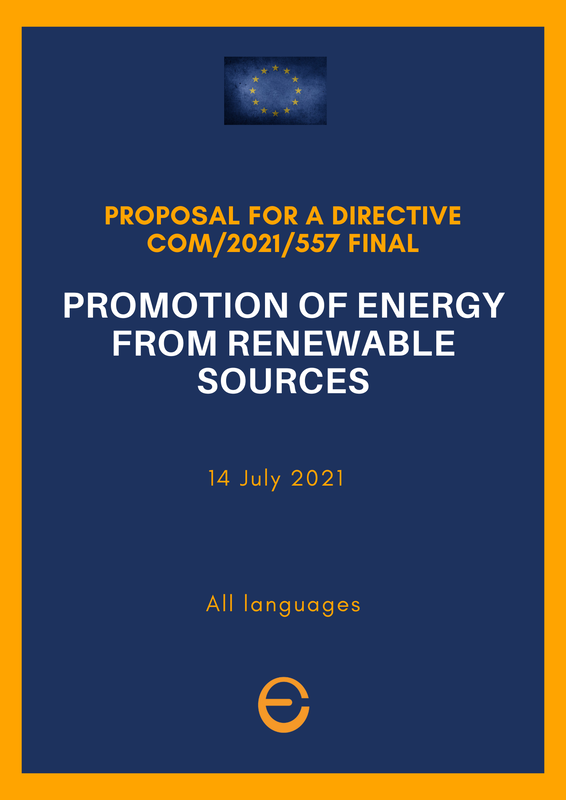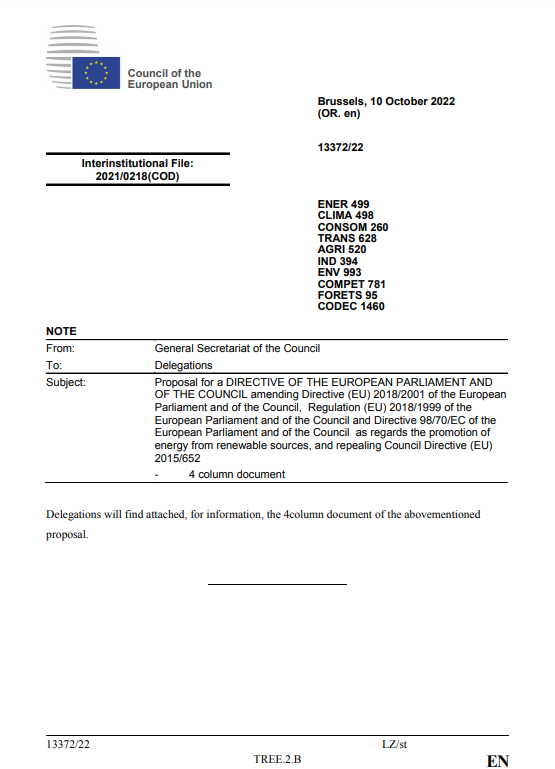|
Brussels, |
|
EU to rise Renewables to 42,5% by 2030
Council and European Parliament reach an agreement
Another challenge comes from Europe. The Council and Parliament negotiators have reached a provisional political agreement to increase the share of renewable energy in the EU's overall energy consumption to 42.5% by 2030, with a potential top-up to reach 45%. This agreement includes sector-specific targets in transport, industry, buildings, and district heating and cooling to accelerate the integration of renewables in sectors that have been slower to incorporate them. The agreement will need to be endorsed by both institutions before being implemented.
Brussels, 3 April 2023 - 5 MINUTES READ
|
After the ban of new cars with thermal engines from 2035 (with the exception of synthetic fuel), the imminent new rules for the energy efficiency of buildings, the use of renewables imposed on industry and homes, Europe is now asking another miracle.
Which EU countries are now facing huge costs to introduce renewable energies?
As you can see in the graphs on this page, the EU countries that most have to deal with large investments in renewable energy are, among the largest: Hungary, Poland, Bulgaria, France, Belgium, the Czech Republic, Holland, which on average only 15% produce electricity from renewable energies, against the average of almost 45% in other countries. What this means for Transport?The provisional agreement allows member states to choose between two binding targets for the transport sector: a 14.5% reduction in greenhouse gas intensity from the use of renewables by 2030 or a 29% share of renewables in the final energy consumption of the sector by 2030. The agreement also includes a binding sub-target of 5.5% for advanced biofuels and renewable fuels of non-biological origin (such as renewable hydrogen and hydrogen-based synthetic fuels) in the share of renewable energy supplied to the transport sector, with a minimum requirement of 1% of renewable fuels of non-biological origin by 2030.
What about Industry?The provisional agreement includes a provision for the industry to increase its annual use of renewable energy by 1.6%. The agreement also sets targets for the use of renewable fuels of non-biological origin (RFNBOs) in industry, with 42% of hydrogen used in industry expected to come from RFNBOs by 2030 and 60% by 2035. Member states will have the option to discount the contribution of RFNBOs in industry use by 20%, provided that their national contribution to the binding overall EU target meets their expected contribution and the share of hydrogen from fossil fuels consumed in the member state is not more than 23% in 2030 and 20% in 2035.
|
Bioenergy
The provisional agreement includes stronger sustainability criteria for the use of biomass for energy, aimed at reducing the risk of unsustainable bioenergy production. The agreement also emphasizes the application of the cascading principle, which prioritizes the use of biomass for higher-value products before energy production, with a focus on support schemes and taking into account national specificities.
Measures for building
The provisional agreement sets an indicative target of at least a 49% renewable energy share in buildings by 2030. It also includes a gradual increase in renewable targets for heating and cooling, with a binding increase of 0.8% per year at the national level until 2026, and 1.1% from 2026 to 2030. In addition, there will be additional indicative increases calculated specifically for each member state, on top of the minimum annual average rate applicable to all member states.
The provisional agreement includes accelerated permitting procedures for renewable energy projects, aimed at fast-tracking the deployment of renewable energies in the context of the EU's REPowerEU plan to become independent from Russian fossil fuels following Russia's invasion of Ukraine. Member states will establish renewable acceleration areas, where renewable energy projects will undergo simplified and fast permit-granting processes. Renewable energy deployment will also be presumed to be of "overriding public interest," which would limit the grounds for legal objections to new installations.
The provisional agreement includes accelerated permitting procedures for renewable energy projects, aimed at fast-tracking the deployment of renewable energies in the context of the EU's REPowerEU plan to become independent from Russian fossil fuels following Russia's invasion of Ukraine. Member states will establish renewable acceleration areas, where renewable energy projects will undergo simplified and fast permit-granting processes. Renewable energy deployment will also be presumed to be of "overriding public interest," which would limit the grounds for legal objections to new installations.
Production of renewables in the EU
In 2020, Austria and Sweden had the highest share of electricity consumed from renewable sources among EU Member States, with more than 70% of electricity generated from renewable sources. Other countries with high shares ....
© Copyright eEuropa Belgium 2020-2023
Source: © European Union, 1995-2023
Source: © European Union, 1995-2023




